Check in
There is a topic for each month in 2023 here at Becoming. September’s is “colors and seasons.”
Every schoolchild knows September is the month when fall colors begin and colorful paper leaves grace classroom bulletin boards.

Besides color, though, September is a month of longing, of returning and remembering.
Song lyrics
You are suddenly aware That the autumn leaves are turning Just the color of her hair.
That is from “The Windmills of Your Mind,” a tune written by Michel Legrand for the 1968* movie The Thomas Crown Affair. It won an Oscar.
The words are by the husband and wife team of Alan and Marilyn Bergman. They wrote many familiar songs, including “The Way We Were,” “You Don’t Bring Me Flowers,” and “What Are You Doing for the Rest of Your Life?”
I’m intrigued by one of their titles, “Marmalade, Molasses and Honey,” written to music by Maurice Jarre for the movie The Life and Times of Judge Roy Bean. It is definitely a feel-good song.
*1968 was a good year for American cinema, with dozens of memorable films. Among them: “2001: A Space Odyssey,” “Funny Girl,” “Planet of the Apes,” “Rosemary’s Baby,” “The Odd Couple,” “The Producers,” “Bullitt,” “Charly,” “The Heart is a Lonely Hunter,” “The Lion in Winter,” “Oliver!” (best picture), “Paper Lion,” Zefirelli’s “Romeo and Juliet,” “I Love You, Alice B. Toklas,” Night of the Living Dead,” and “The Swimmer.” Also, “Hot Millions,” with Peter Ustinov and Maggie Smith, an all-time favorite that never streams for free.
More music
The haunting “September Song” was composed by Kurt Weill, lyrics by Maxwell Anderson. It comes from the 1938 Broadway musical Knickerbocker Holiday. But it's a long, long while From May to December And the days grow short When you reach September September, November … These precious days I’d spend with you Walter Huston sang this song on the Broadway stage.
September pivot
Trees start turning in September, and the sadness begins.
The tristesse of turning leaves infuses this poem by Gerard Manley Hopkins.*
Spring and Fall
to a young child
Márgarét, áre you gríeving
Over Goldengrove unleaving?
Leáves like the things of man, you
With your fresh thoughts care for, can you?
Ah! ás the heart grows older
It will come to such sights colder
By and by, nor spare a sigh
Though worlds of wanwood leafmeal lie;
And yet you wíll weep and know why.
Now no matter, child, the name:
Sórrow’s spríngs áre the same.
Nor mouth had, no nor mind, expressed
What heart heard of, ghost guessed:
It ís the blight man was born for,
It is Margaret you mourn for.*The accents over some syllables reflect Hopkin’s innovation, “sprung rhythm,” which emphasizes natural speech patterns.
“Season of mist and mellow fruitfulness,” begins another poetic tribute to the season, “To Autumn,” by John Keats. This poem is full of images: mossed cottage-trees, cider presses, full-grown lambs and gnats by the riverside. Find it at the Poetry Foundation.
Ends and beginnings
As Earth in the Northern Hemisphere turns toward crisper fall weather, crops ripen, school starts, trees tick toward their inevitable winter shutdown.
Welcome, September, in all your glory and sadness.

Dilemma
You are on the horns of a dilemma when there are two alternatives facing you. That’s the “di” part.
Sometimes a dilemma is described as “being in a pickle.” I don’t know how that word came to indicate a difficulty, but I’m all for it.
And now, it seems, pickles can lift you out of a difficulty.
National Geographic recently reported that research shows eating fermented food—yogurt, sauerkraut, pickles, and kimchi, all those sources of happy, healthful bacteria—markedly reduces social anxiety.
I’ve always found that pickles, yogurt or the like can pick me right up when I feel down. It’s partly the tang, but also all those microscopic animals.
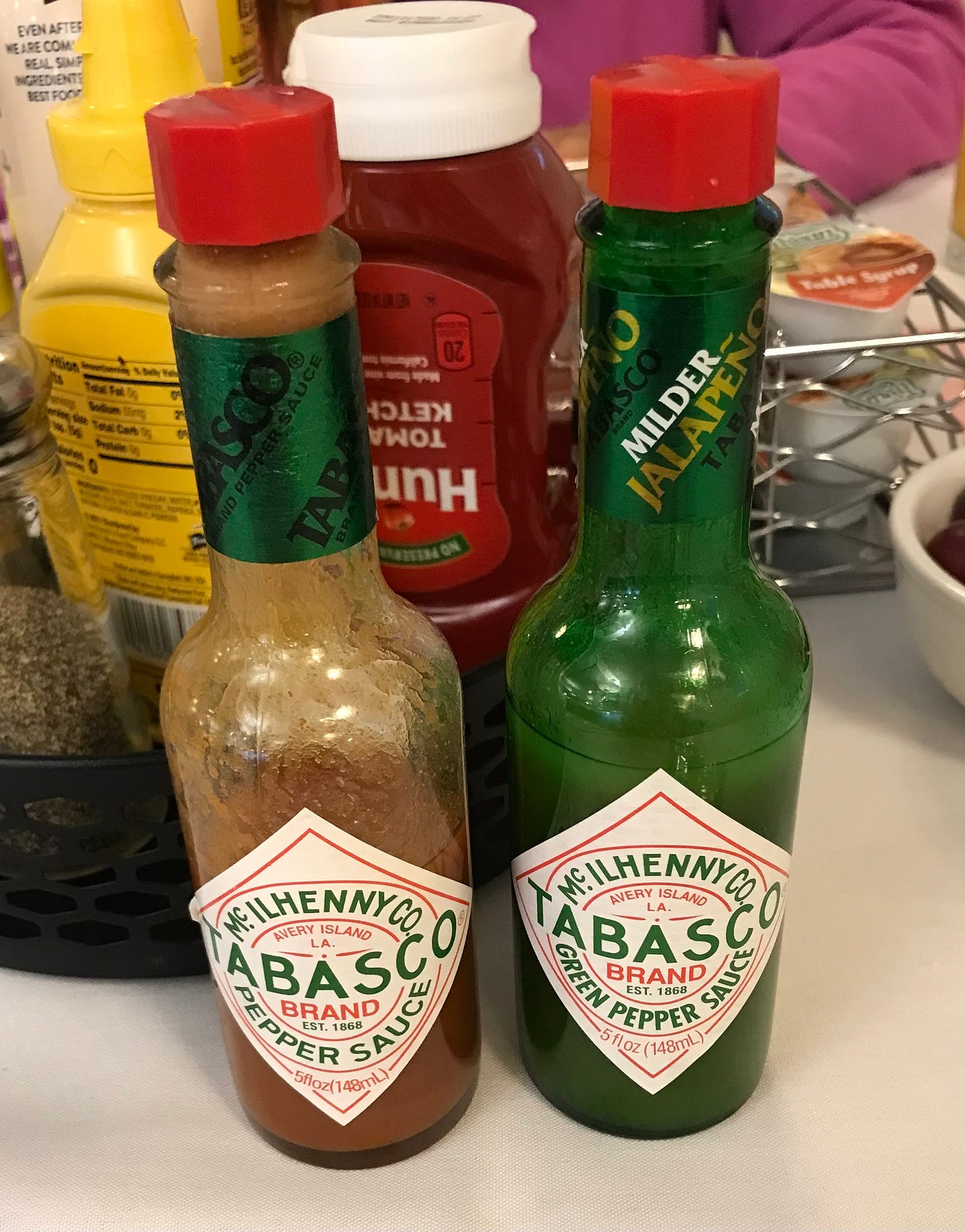
Want more info on Tabasco? Here’s a 7-minute report:
Fortunetelling, or just fortunate
How do you resolve a dilemma, get out of a pickle? Find an answer?
Some people draw Tarot cards, cast I Ching, read a random Bible verse. I have a book of Celtic oracles in which the patterns of coins you toss lead you to small insights.
On your way to understanding and resolution, use anything that helps you access the below, the layer of unconscious that holds the answers. Meditation helps. Or just sitting quietly and watching the clouds.
Your secrets are buried deep. That doesn’t mean you can’t dig them up. Sometimes the excavation is really worth it.
Magpie
When I downsized the second time, to move into Rose Schnitzer Manor, I recycled an old coffee can full of things I had picked up off the street over the years: shiny metal like screws and nuts, a computer chip, rocks, pennies, flanges. I had in the back of my mind that I was going to make some sort of sculpture, but that was never going to happen. How would I glue the thing together?
For years, though, I was a magpie, picking up shiny objects and taking them home.
As a child, when I stumbled, my mother acerbically told me to me to look where I was going. So I did. It might have contributed to my round shoulders that I was continually peering at the ground. Besides shiny things, I’ve found any number of interesting rocks and an arrowhead or two.
Not that I don’t see the clouds and trees. But I also notice the primroses growing in the crannies. Brick pavers with broken mortar. Sidewalks slickly new or gray-black and crumbling with age.

Clover
One thing I got good at finding, looking down, was four-leaf clovers.
I recently met a woman who said she has found 17 four-leaf clovers so far this year. Last year, she found 38, and she hopes to break that record.
Portland is good hunting for four-leaf clovers. Find clover along the edge of sidewalks and driveways. Just look carefully enough and the pattern will appear.
As a bonus, they run in packs. If you find one, chances are, you will find another, or several. My children once found dozens in the grass in front of a stage at a Native American pow-wow in Central Oregon.
I discovered several four-leaf clovers I had long before pressed in paper towels and laid in a dictionary for safekeeping. But then I gave the dictionary away and the clovers, forgotten, went with it.
Not found everywhere
When I was a child, I thought four-leaf clovers were possibly a myth. I could never find one in Minnesota. Clover Leaf Dairy out of Minneapolis had a promo in about 1960—you could claim a free carton of milk with a four-leaf clover. So they couldn’t have been too common.
A favorite book of mine in childhood was The Amazing Vacation, by Dan Wickenden. It has pretty line drawings by Eric Blegvad, one of my favorite illustrators. Two children find and eat four-leaf clovers at the same time and are transported to a magic land where they meet characters like the Fretful Porpentine (out of Hamlet).
I’ve been rereading that book, and though it’s aimed at middle-aged children (the pair in the book are 10 and 11), the author is unafraid to quote Shakespeare or Wordsworth (“The Lotus Eaters,” no less). It is a delightful book, and I found it at the Portland State University library. A new policy there let me check it out because I have a Multnomah County Library card.
Irish last word
My sister, Catherine, and her wife, Anne, and I were in County Kerry, Ireland, when I spied these hay bales.
Fantasy ride
Sulky, my power chair, and I took the 57 Forest Grove bus on a long trek from Beaverton to Hillsboro to check out the Celtic Fantasy Faire last Saturday. A lot of folks came in costume. I saw kilts, kirtles, snoods, swords, helmets, cowls and headgear with curly horns.
I couldn’t access most of the booths, because they were set up in Shute Park on dirt and grass, and Sulky resisted those bumpy surfaces. It also made it difficult to get any decent photos
Sulky and I sat on a grassy corner. I put a sign around my neck: “Let me write you a poem. It’s free!”
I couldn’t stay long, but I got some takers. A little girl wanted a poem about Hello Kitty. I gave away a poem about dragons without making a copy. Here’s one I wrote about the moon for a woman who never came back for it.
To Moon
Silver slivers New in the sky. Bring me a wish, Moon! I’m ready for help. Silver, no, gold, Moon. A new love, an old. Pretty white stars, Moon, A necklace of jade. I am your servant, Moon. My hand at your heart. Lay the wish in my palm. Let me know, let me know. I’m patiently waiting The knowledge will come. Till then, wash me with silver And kiss me good night.
I bought one thing at the Celtic Fantasy Faire: a little purple dragon dangling from a fish line on a stick. A few people have noted that it would make a good cat toy.
Check out
Now is the time to find color everywhere. Like these tomatoes at the farmers market.
Do you have a favorite color? Look for it in your surroundings this week. Wear it every day. Do you have a mug or dishes in this color?
Read a book with color in the title: The Scarlet Letter, The Green Man, The Color Purple, The Red Badge of Courage, The Woman in White, Black Beauty, The Amber Spyglass. (There’s an exhaustive list at Goodreads.)
Or listen a colorful song: “Blue Moon,” “Blue Suede Shoes,” “A Whiter Shade of Pale,” “The Red River Valley,” “Yellow Submarine,” “Purple Rain,” “Men in Black,” “Greensleeves.” An album, “The Colors of the Day,” by Judy Collins.
Now, dear friends, I’ve written plenty. I hope you will click the “like” heart above, and please subscribe if you not yet done so.
The moon is full outside my window, waning just a bit from Thursday’s blue moon. It brings me wishes and waits to kiss me goodnight.
—30—
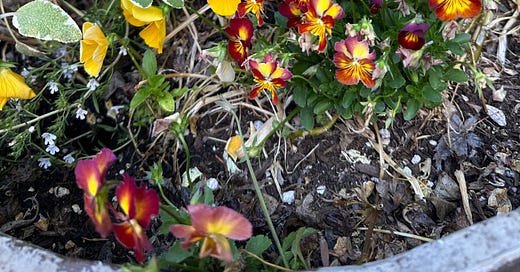


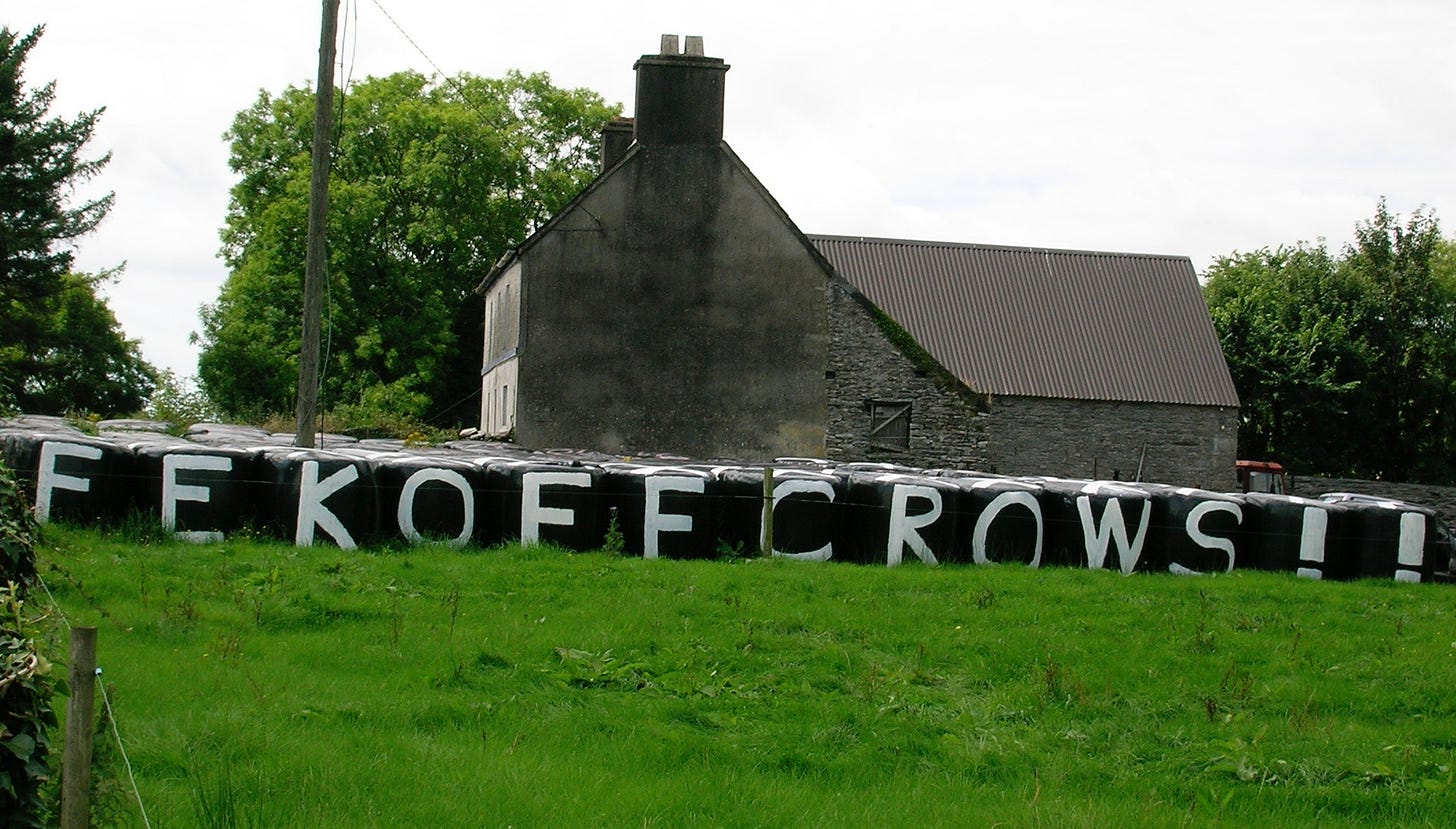
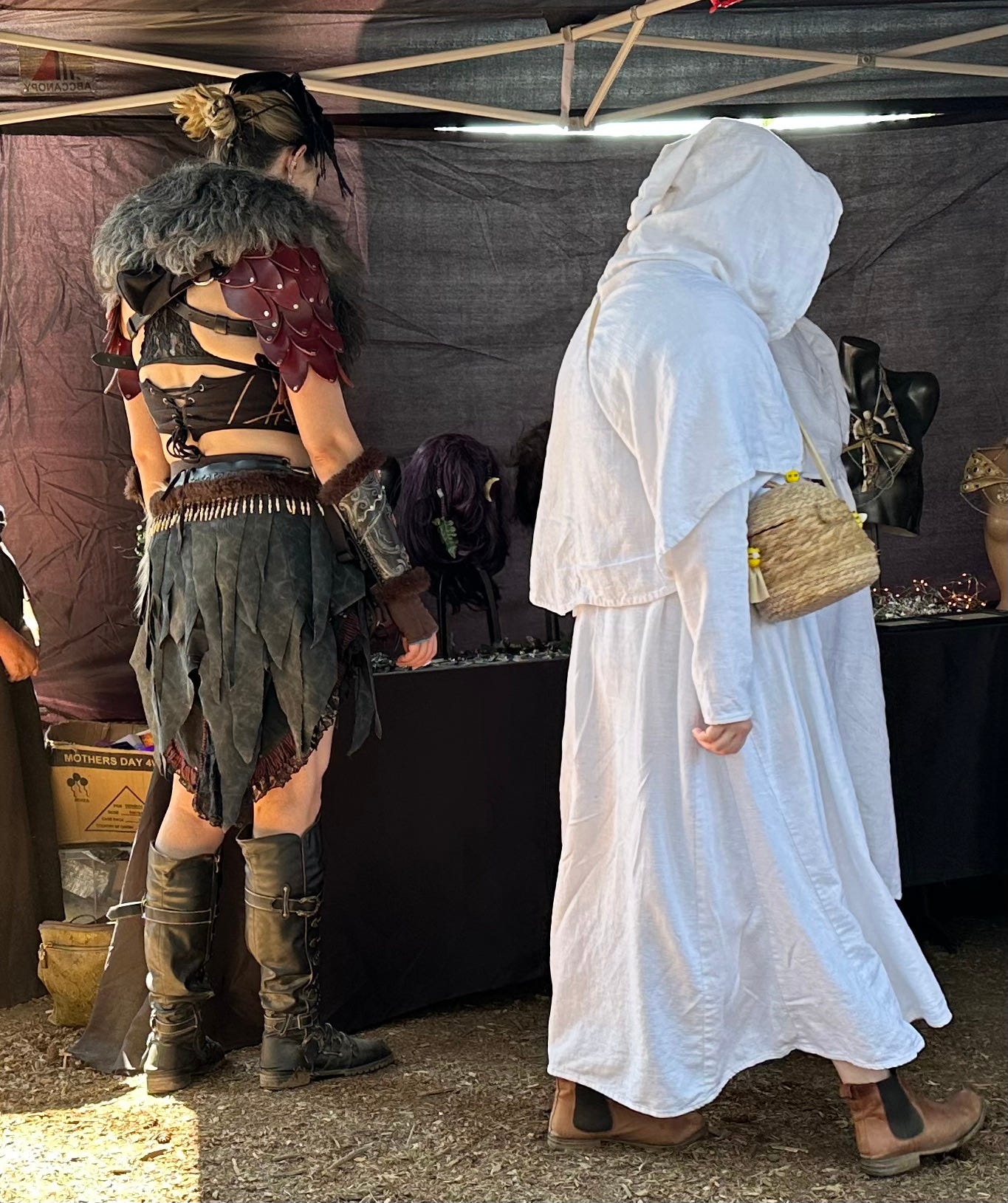
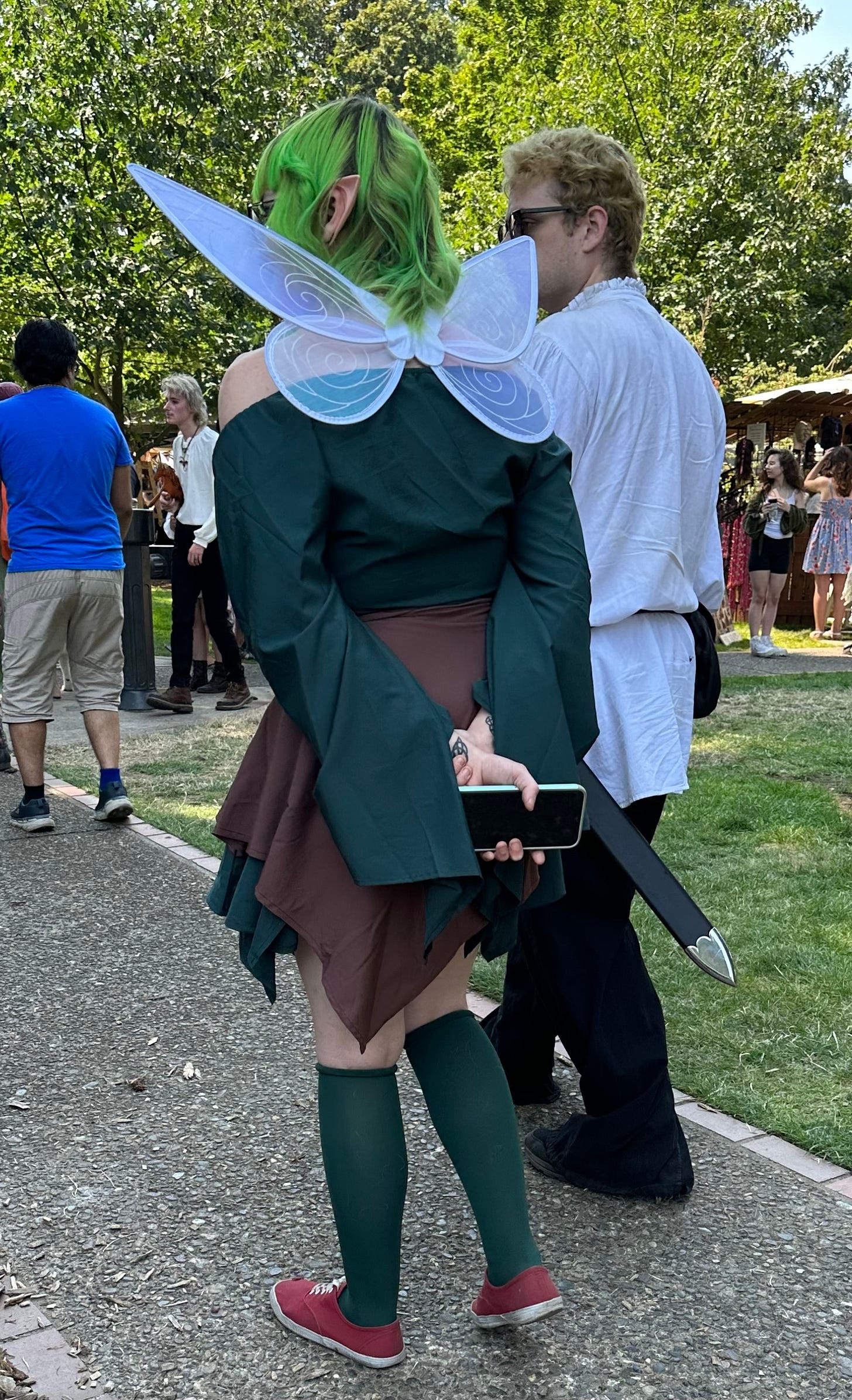
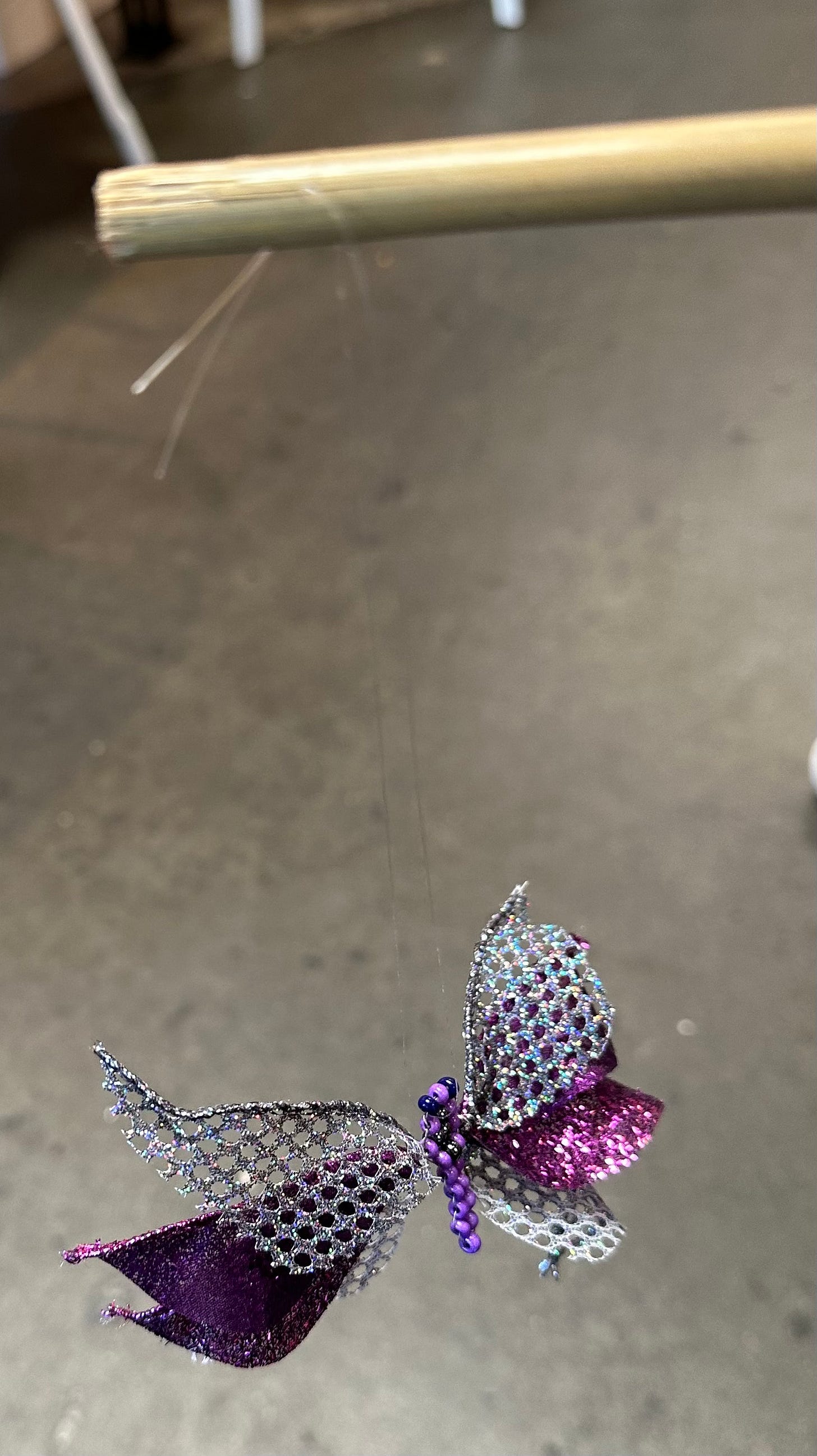

Love the magpie section and story.... so understand that collection of small things. Great photo with the chair on the wall outside the store. I wish you had a photo of you at the festival with the free poetry sign. What an awesome thing to have done!
Such a lyrical, colorful intro to autumn. Thanks.